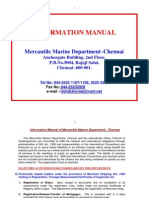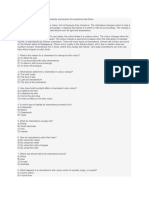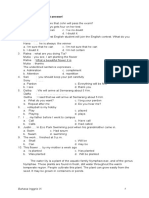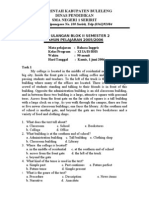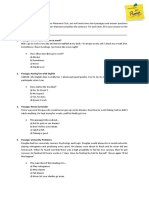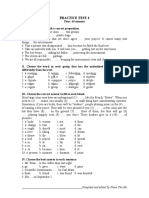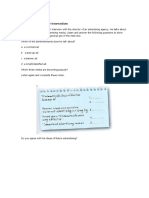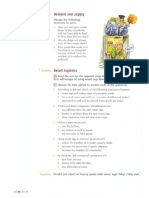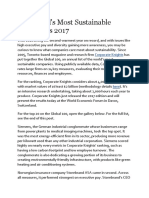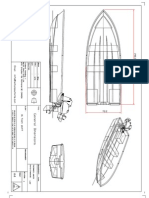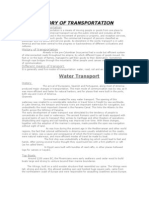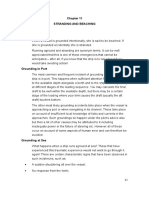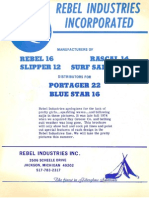Class 18
Class 18
Uploaded by
selef1234Copyright:
Available Formats
Class 18
Class 18
Uploaded by
selef1234Original Description:
Copyright
Available Formats
Share this document
Did you find this document useful?
Is this content inappropriate?
Copyright:
Available Formats
Class 18
Class 18
Uploaded by
selef1234Copyright:
Available Formats
- Describe the picture: Women in Kenya spend up to five hours a day fetching water.
Where do you think the women are going?
How often do you think they make this trip?
What do they do with the water they collect?
- How much water do you drink every day?
- What are the things you do in a day that require water? How much water do you need to
use for a day?
- Do you think that we take water for granted nowadays?
- ‘We never know the worth of water till the well is dry’
- What do you think it would be like to have no fresh drinking water?
- What do you think of the fact that most of the world’s population Is without clean water,
yet rich countries spend billions on oil, brand goods, tourism?
- How do you think you can be part of the solution to this problem?
1. Complete the sentences with four of these numbers.
1/5 2/3 3 17 10 46 70 200
a. About ………….. per cent of the Earth’s surface is covered in water.
b. Only ………….. per cent of the Earth’s water is fresh water.
c. Around ………….. per cent of people don’t have running water in their homes.
d. A person in the developing world uses about ………….. liters of water each day.
e. In Europe, the average is ………….. liters a day.
2. Now, listen to a radio clip about World Water Day. Check your answers.
Do you know when WWD is celebrated?
3. Describe the pictures.
Diving fishing jet-skiing kayaking rafting rowing sailing snorkeling surfing swimming water-
skiing wind surfing lake marina ocean pool reservoir river sea stream waterfall
Have you ever done any of these activities?
Now, you’re going to listen to the people in two of the photos talking about their photo.
4. Are these sentences TRUE or FALSE?
a. The girl was rafting down the Zambezi.
b. The raft was approaching some rapids.
c. She saw a hippo near the river bank.
d. The boy learned to dive because he was bored.
e. He went diving in a dangerous cenote.
f. He wasn’t concentrating on what he was doing.
What do you think happened next?
a. The hippo came after them and attacked the raft.
b. A crocodile jumped into the river close to the raft.
c. The raft capsized and they all swam to the river bank.
d. His air ran out and he had to go to the surface.
e. His mother panicked when he saw a sea snake.
f. He almost got lost in a labyrinth of tunnels.
5. Grammar – past simple and past continuous
Underline the past simple verbs and circle the past continuous verbs.
1. We were going around a small island.
2. It jumped into the water about a meter away from our boat.
3. The sun was shining in through an opening in the roof.
4. My mom realized pretty quickly that I was missing and she came after me.
a. An unfinished activity
b. A description
c. A finished action
d. A sequence of actions in a story
Questions in the past simple/ past continuous refer to activities before the key event.
Questions in the past simple/past continuous refer to activities after the key event.
Practice
1. Write sentences with the past simple and past continuous. Use because, when, while and
so.
a. I …………….. (take) a photo of the hippo/ I …………….. (drop) my camera in the water.
b. My friend …………….. (fall) out of the raft/ he …………….. (not/hold) on.
c. I …………….. (see) some strange fish/ I …………….. (dive).
d. I …………….. (have) some problems with my mask / my brother …………….. (help) me.
Talk about an anecdote from a trip. Maybe the first time you tried a new skill, or sports activity.
5. Grammar – past perfect simple
Choose the correct options
1. When Titanic hit the iceberg, it was/had been at sea for four days.
2. When Titanic hit the iceberg, it sank/had sunk.
3. By the time Ballard found the wreck, many items disappeared/had disappeared.
4. They developed video technology because other techniques didn’t locate/hadn’t
located the wreck.
5. James Cameron made his movie because he visited/had visited the wreck.
Love and death in the sea
1. Do you like swimming?
2. Are you scared of the ocean?
3. Are there any places you wouldn’t go swimming? Why?
4. Have you ever had a bad experience while swimming?
5. A couple of times
On several/two occasions
My guts jump to my throat
I feel afraid/angry
I decided to call it a day
I decided to stop/try again tomorrow
I was having a hard time
It was difficult for me/it took a long time
I decided to let myself go
I decided to stop swimming/try again
I scrambled out of the water
I moved quickly/slowly
6. Sala talks about three decisions he took. What were the decisions and what were the
consequences of each one?
7. What is the moral?
8. Word focus: get
Look at the verbs in bold in these sentences. Find expressions with get in the article
which match the verbs.
a. I entered the pool.
b. The weather didn’t improve.
c. I couldn’t reach the shore.
d. I wasn’t moving towards the land.
e. We receive so much from nature.
f. I’d escaped from that dangerous situation.
Video – Looking for a solution to water shortage
https://www.youtube.com/watch?v=VIaw5mCjHPI
You might also like
- Unit 4Document4 pagesUnit 4selef1234No ratings yet
- Stranded On A Desert Island Lesson PlanDocument15 pagesStranded On A Desert Island Lesson PlanDespina Karamitsou75% (4)
- Manual Sea Ray 270Document30 pagesManual Sea Ray 270Henriques BrunoNo ratings yet
- Reading Practice Gilbert Peña TimoteoDocument2 pagesReading Practice Gilbert Peña TimoteoGilbert Peña TimoteoNo ratings yet
- English Grammar ExercisesDocument171 pagesEnglish Grammar ExercisesadlingvistNo ratings yet
- Class 7Document6 pagesClass 7selef1234No ratings yet
- EMA Flood Rescue Boat ManualDocument144 pagesEMA Flood Rescue Boat ManualShane Briggs100% (6)
- Informationmanual MMD ChennaiDocument13 pagesInformationmanual MMD ChennaishivakuchanaNo ratings yet
- Waste Delivery Receipt Form For The Vessels Calling Romania's PortsDocument13 pagesWaste Delivery Receipt Form For The Vessels Calling Romania's Portssuiramamid79No ratings yet
- tt6 - Test 4Document10 pagestt6 - Test 4Toñi Lopez100% (5)
- Rtfully Uniting Extraordinary Homes With Extraordinary LivesDocument77 pagesRtfully Uniting Extraordinary Homes With Extraordinary Livesbrent_stackNo ratings yet
- Carrion - Jhuliana - Activity 007 - LIFE 4 SECOND EDITIONDocument5 pagesCarrion - Jhuliana - Activity 007 - LIFE 4 SECOND EDITIONGermania BecerraNo ratings yet
- Ingles TallerDocument4 pagesIngles Tallerdiana cardozoNo ratings yet
- Natural Wonders of Viet Nam: Geography ClubDocument13 pagesNatural Wonders of Viet Nam: Geography Clubviệt thắngNo ratings yet
- 3rd Year PT 2009-2010Document6 pages3rd Year PT 2009-2010Shiela RepeNo ratings yet
- Qpaper AmanjotDocument5 pagesQpaper Amanjotaman26484No ratings yet
- Deep WaterDocument15 pagesDeep Watersinghdurga655No ratings yet
- Res 34542 Grip On GrammarDocument20 pagesRes 34542 Grip On GrammarnashmarsNo ratings yet
- Video Zone: A Plastic Ocean - Exercises: PreparationDocument2 pagesVideo Zone: A Plastic Ocean - Exercises: Preparationmag92_No ratings yet
- Unit 2 - Study GuideDocument20 pagesUnit 2 - Study GuideAbigail RijoNo ratings yet
- ACTIVITY TASK 5 - Passive VoiceDocument5 pagesACTIVITY TASK 5 - Passive VoiceSara NiñoNo ratings yet
- I. Choose The Correct Answer!Document7 pagesI. Choose The Correct Answer!Hard DianNo ratings yet
- Pemerintah Kabupaten Buleleng Dinas Pendidikan Sma Negeri 1 SeriritDocument7 pagesPemerintah Kabupaten Buleleng Dinas Pendidikan Sma Negeri 1 SeriritDex Surya GoesNo ratings yet
- Trabajo Inglés Sandra Milena MontoyaDocument6 pagesTrabajo Inglés Sandra Milena MontoyaSandra Milena MontoyaNo ratings yet
- Test 4 - Module 4: VocabularyDocument6 pagesTest 4 - Module 4: VocabularyCsaba StudiumNo ratings yet
- Text 1 For Questions Number 1 To 4: Drill 1Document35 pagesText 1 For Questions Number 1 To 4: Drill 1Rangga SaputraNo ratings yet
- Lecturas InglesDocument14 pagesLecturas InglesLenin OtáloraNo ratings yet
- Kelas 9 UasDocument7 pagesKelas 9 UasAsep BambangNo ratings yet
- Bahasa Inggris Us Sma 2019Document11 pagesBahasa Inggris Us Sma 2019Farel MuhammadNo ratings yet
- Anh 6 Kim Hien Unit 5Document9 pagesAnh 6 Kim Hien Unit 5Diệu NguyễnNo ratings yet
- 25.11.20 - Homework (Thesigan Krishshanthan)Document8 pages25.11.20 - Homework (Thesigan Krishshanthan)Calvin NestNo ratings yet
- Unit 9Document6 pagesUnit 9Bao TranNo ratings yet
- Deep WaterDocument11 pagesDeep WaterADITIYANo ratings yet
- Topic: Past Simple With Verb To BeDocument7 pagesTopic: Past Simple With Verb To Besalome Gil RicoNo ratings yet
- Lớp 8 Test YourselfDocument3 pagesLớp 8 Test YourselfThảo PhươngNo ratings yet
- Test 6 - Module 6: VocabularyDocument6 pagesTest 6 - Module 6: Vocabularygabriella56No ratings yet
- DLP in Science (Different Sources of Water)Document6 pagesDLP in Science (Different Sources of Water)solivalhovelyNo ratings yet
- Lighthouse 6 Students Book Unit 1Document10 pagesLighthouse 6 Students Book Unit 1Crónica Verónica100% (1)
- Bahasa InggrisDocument11 pagesBahasa Inggrisrobby putraNo ratings yet
- Escrito de 4º Inglés SetiembreDocument2 pagesEscrito de 4º Inglés SetiembreAdriana MoralesNo ratings yet
- ListeningJuiceforKidsSB3 AKDocument32 pagesListeningJuiceforKidsSB3 AKIMS AcadNo ratings yet
- Species, Habitat, Predator, Prey, Hunt, Wild, Tame, Protect, Extinct, WildlifeDocument4 pagesSpecies, Habitat, Predator, Prey, Hunt, Wild, Tame, Protect, Extinct, WildlifeRonny PocheNo ratings yet
- LPDocument4 pagesLPLadringan April AnnNo ratings yet
- 4_5990070392423715926Document27 pages4_5990070392423715926abdelaziznaira5No ratings yet
- Қаңтар ҰБТ ға дайындық Barbecue нұсқасы 5Document9 pagesҚаңтар ҰБТ ға дайындық Barbecue нұсқасы 5aiauerbakyt035No ratings yet
- XII - Deep Water - Notes - 1 - 2023 - 2024Document9 pagesXII - Deep Water - Notes - 1 - 2023 - 2024Hari prakarsh NimiNo ratings yet
- English 1st Paper (HSC 22 SMP English) Class 01Document49 pagesEnglish 1st Paper (HSC 22 SMP English) Class 01amie0667No ratings yet
- 2-Regular and Irregular VerbsDocument13 pages2-Regular and Irregular VerbsJairzhinio BAUTISTA SANCHEZNo ratings yet
- Choose The Best Answer A, B, C or DDocument7 pagesChoose The Best Answer A, B, C or DHadiNo ratings yet
- My Grandmother: Kelas 8 Description of The TigerDocument8 pagesMy Grandmother: Kelas 8 Description of The Tigeraviana arum kharismaNo ratings yet
- Pembahasan ListeningDocument4 pagesPembahasan ListeningSiti SholikhaNo ratings yet
- PTS Kelas X 2020Document7 pagesPTS Kelas X 2020Zharisti ChannelNo ratings yet
- Soal Ujian Sekolah Bahasa InggrisDocument11 pagesSoal Ujian Sekolah Bahasa InggrisYENI WULAN DARINo ratings yet
- High Flyers / Answer Key G / Unit 4: GrammarDocument8 pagesHigh Flyers / Answer Key G / Unit 4: GrammarDian Novyta AriantiNo ratings yet
- ACTIVITY TASK 5 - Passive VoiceDocument4 pagesACTIVITY TASK 5 - Passive Voicesantiago quicenoNo ratings yet
- Unit 2 Traveller-23Document8 pagesUnit 2 Traveller-23Emilien DumasNo ratings yet
- Đề cương ôn tập HK2 Tiếng Anh 7Document8 pagesĐề cương ôn tập HK2 Tiếng Anh 7myhuyen vuNo ratings yet
- Unit:1 The Ayeyarwady Dolphins: Grade 11 English U Aye MinDocument12 pagesUnit:1 The Ayeyarwady Dolphins: Grade 11 English U Aye Minayemin25100% (1)
- G5 RevisionDocument25 pagesG5 RevisionDina KamalNo ratings yet
- Summative Test 3Document7 pagesSummative Test 3Alex Jr MontemayorNo ratings yet
- Practice Test 4Document3 pagesPractice Test 4Pham Thu HaNo ratings yet
- Soal PTS Genap Bing Kelas 8Document7 pagesSoal PTS Genap Bing Kelas 8SynsNo ratings yet
- Task 2 - Writing Task ForumDocument12 pagesTask 2 - Writing Task ForummatiasNo ratings yet
- Very Cold ThereDocument5 pagesVery Cold ThereFernanda MenegazzoNo ratings yet
- Niagara! (B2) : A - Before You StartDocument3 pagesNiagara! (B2) : A - Before You StartCynthia CobucciNo ratings yet
- 45 - English For DentistryDocument10 pages45 - English For DentistryAnonymous DvNUbkXyNo ratings yet
- Further Practice On Present SimpleDocument2 pagesFurther Practice On Present Simpleselef1234No ratings yet
- Listening About AdvertisingDocument1 pageListening About Advertisingselef1234No ratings yet
- Conditional Practice TestDocument1 pageConditional Practice Testselef1234No ratings yet
- Recur SosDocument2 pagesRecur Sosselef1234No ratings yet
- Possessive Forms of NounsDocument4 pagesPossessive Forms of Nounsselef1234No ratings yet
- The World's Most Sustainable Companies 2017: Corporate KnightsDocument3 pagesThe World's Most Sustainable Companies 2017: Corporate Knightsselef1234No ratings yet
- Upper Intermediate Unit 1 - Relationships NotesDocument1 pageUpper Intermediate Unit 1 - Relationships Notesselef1234No ratings yet
- Present Perfect Vs Past Simple ReviewDocument2 pagesPresent Perfect Vs Past Simple Reviewselef1234No ratings yet
- Sat Nav Search Engine Ebook Podcast Astronomy Shut Down SurveyDocument1 pageSat Nav Search Engine Ebook Podcast Astronomy Shut Down Surveyselef1234No ratings yet
- #2 Icebreaker: Matching Pictures: Language. A Good Way To Learn English IsDocument4 pages#2 Icebreaker: Matching Pictures: Language. A Good Way To Learn English Isselef1234No ratings yet
- Unit MediaDocument12 pagesUnit Mediaselef1234No ratings yet
- Practice Paper Present SimpleDocument3 pagesPractice Paper Present Simpleselef1234No ratings yet
- Architecture DiscussionDocument1 pageArchitecture Discussionselef1234No ratings yet
- Unit 2Document8 pagesUnit 2selef1234No ratings yet
- Listening Test First Certificate Cambridge FCEDocument6 pagesListening Test First Certificate Cambridge FCEselef1234No ratings yet
- ExercisesDocument1 pageExercisesselef1234No ratings yet
- Key Word Present Perfect 1 and AnswersDocument4 pagesKey Word Present Perfect 1 and Answersselef12340% (2)
- NotesDocument1 pageNotesselef1234No ratings yet
- Motor Boats & Launch CatalogueDocument98 pagesMotor Boats & Launch CatalogueDeganchileNo ratings yet
- Msbjournal 28 FebruaryDocument33 pagesMsbjournal 28 Februaryalex mvp100% (2)
- Centek Industries Product CatalogDocument48 pagesCentek Industries Product CatalogAnand Smart100% (1)
- Pitman S Shorthand 00 Pit Mial ADocument286 pagesPitman S Shorthand 00 Pit Mial ARaouf Luck100% (2)
- Disneyland Attraction GuidebookDocument21 pagesDisneyland Attraction GuidebookJilliene IsaacsNo ratings yet
- Boat Design GlossaryDocument10 pagesBoat Design GlossaryTarek MohamedNo ratings yet
- Nacrt CamcaDocument31 pagesNacrt Camcapikemanserbia50% (4)
- Stephanie Mathieu - StewDocument1 pageStephanie Mathieu - Stewapi-295229760No ratings yet
- Star Kite InstructionsDocument5 pagesStar Kite InstructionslgldguevaraNo ratings yet
- Factors Affecting GZ CurvesDocument11 pagesFactors Affecting GZ CurvesAbdallah Mansour100% (2)
- Parasailing - A Kind of SportDocument14 pagesParasailing - A Kind of SportNadyaCazacNo ratings yet
- We Are Not Afraid To Die Part 2Document7 pagesWe Are Not Afraid To Die Part 2Anonymous ExAwm00UPNo ratings yet
- MEO Class 4 Online Exam of Ship Construction.Document19 pagesMEO Class 4 Online Exam of Ship Construction.Ashwani KumarNo ratings yet
- St. Pete Pier Proposal: The Pier ParkDocument58 pagesSt. Pete Pier Proposal: The Pier Park10News WTSPNo ratings yet
- PRR4336 ShotSpotterDocument261 pagesPRR4336 ShotSpotterRecordTrac - City of OaklandNo ratings yet
- History of TransportationDocument6 pagesHistory of TransportationgaytrigdNo ratings yet
- 2010 MULTIPLE MATCHING EtornautaDocument21 pages2010 MULTIPLE MATCHING Etornautatarubi53100% (1)
- CH 11 Stranding and BeachingDocument7 pagesCH 11 Stranding and BeachingAmit PandeyNo ratings yet
- Arrangement of Navigation LightDocument6 pagesArrangement of Navigation LightAADINo ratings yet
- 8m0113813r PDFDocument117 pages8m0113813r PDFRade PesteracNo ratings yet
- General Requirements For Rescue BoatsDocument22 pagesGeneral Requirements For Rescue Boatsnelson bunaganNo ratings yet
- Rebel Ind 1974Document7 pagesRebel Ind 1974tcouperNo ratings yet
- Part 1 - Indian OceanDocument57 pagesPart 1 - Indian OceanMaja СтефановићNo ratings yet







